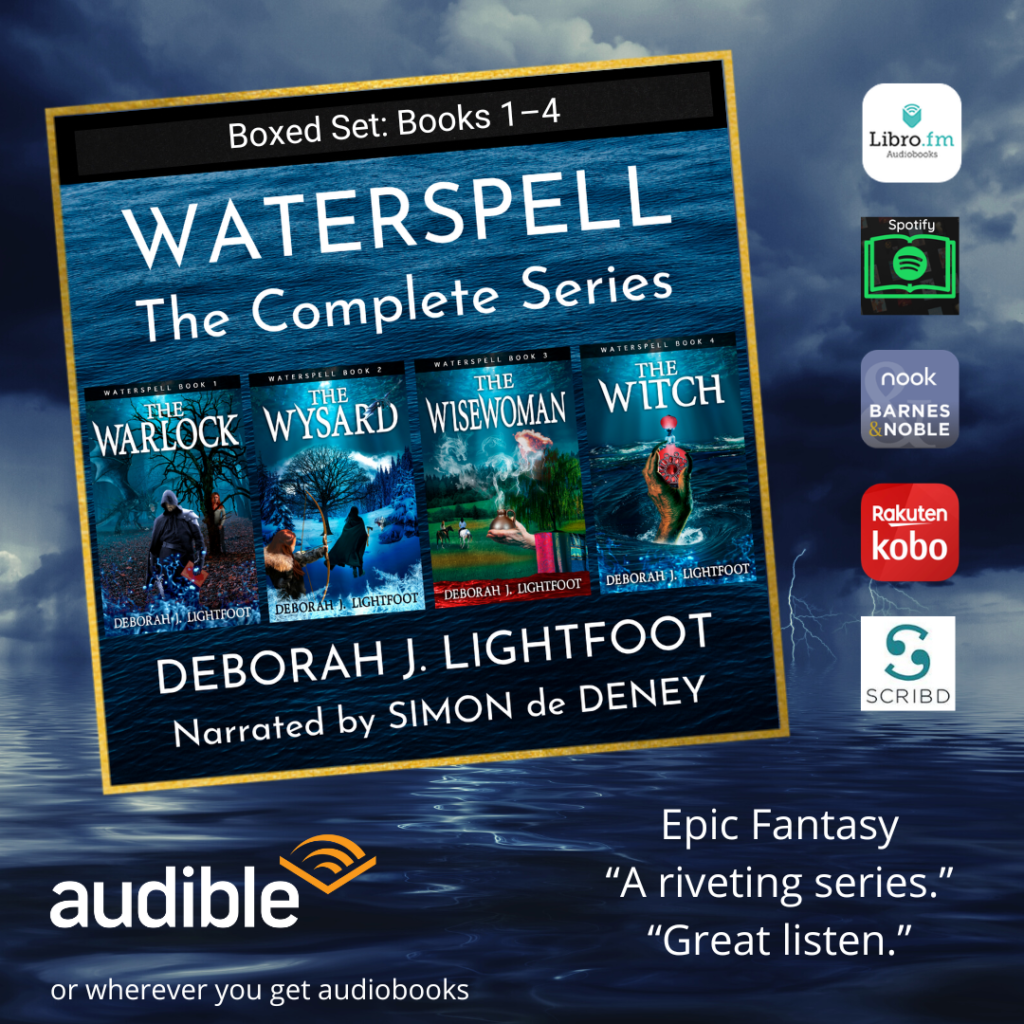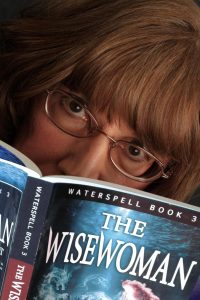I love the idea of a Positive Jar. Starting one for myself this very day.
Category Archives: Writers
Writing Systems and World Building

Continuing through my collection of Great Courses—sets of DVDs that I rediscovered in my bookshelves after forgetting I owned them—I turn today to Professor Marc Zender’s “Writing and Civilization: From Ancient Worlds to Modernity.”
The course’s overview of writing systems from Sumerian cuneiform and Egyptian hieroglyphs to Mayan and Aztec glyphs is fascinating, as is the discussion of the origins of the Roman alphabet. (Flip a capital A upside down and you’ll see an animal’s head with horns. The name of the letter alpha derives from the Hebrew aleph, meaning “ox.” The shape of the letter derives from an earlier symbol resembling the head of an ox. B started as a picture sign for a house in Egyptian hieroglyphs. In Semitic languages the sign was called beth, meaning “house,” but the Greeks changed the name from beth to beta. And so on through the letter Z, adopted from the Etruscans, who got it from the Phoenicians.)
While it’s all been interesting, the lecture nearest to my heart, as a writer and reader of fantasy, deals with so-called featural scripts, including the invented, fictional alphabets designed for works of fantasy and science fiction. The inventions of J.R.R. Tolkien are standouts in this category.
Professor Zender devotes a satisfying amount of time to Tolkien’s writing systems, pointing out that Tolkien was a professional linguist and a specialist in the history of Germanic languages and scripts, both alphabetic and runic. Quoting from the course guidebook:
“In The Hobbit, first published in 1937, Tolkien used Anglo-Saxon runes as a kind of code for Modern English. Tolkien also invented several writing systems of his own, including the cursive script known as Tengwar or Tîw (meaning ‘letters’) and the angular characters designed for cutting into wood, stone, or metal known as Certar or Cirth (meaning ‘runes’). … He even gave his fictional scripts a fictional inventor, Rúmil. … Tolkien provides charts and full descriptions of his writing systems in appendix E of The Lord of the Rings.”
I confess that, until now, I had barely glanced at Appendix E. After completing this series of lectures, however, I got out my much-loved, much-read 1975 Ballantine Books boxed set of LOTR and took a closer look. The knowledge I gained from Professor Zender about the development of “real” writing systems deepened my appreciation for Tolkien’s achievement in creating his fictional scripts and giving them such deeply thought-out histories.
I’ve not gone so far as to invent an alphabet, but I have imagined several specific words in my fictional language of Ladrehdin. My audiobook narrator is having a field day with them.
Now … Anyone up for learning Quenya? Or Sindarin?
Filed under Books and Readers, On Writing, Writers
Fun With DIY Videos at Biteable
A writer friend recently posted a book trailer she’d made with the Animoto video builder. I loved it except for the Animoto watermark that was displayed on it.
Searching for an affordable, flexible, easy-to-use video maker for my own books, I explored Powtoon and Animaker as well as Animoto. With these, it seemed that the only way to avoid the company’s watermark and to outright own my handmade videos was to subscribe for a full year. Shorter, more affordable subscription terms were not offered.
Then I found Biteable. It’s definitely the one for me. You can subscribe monthly instead of for a year, and every video you make while subscribed is yours to download and keep forever. Biteable’s templates are so easy to use, and their library of stock footage is so comprehensive, covering every need, you can create a great many videos in a month, making this service by far the most cost-effective of any that I looked at.
Another great advantage with Biteable is that you are allowed to use the videos you make for commercial purposes, “something that other video editors don’t allow,” notes Brightspark. I can’t imagine why any writer would pay to make videos that they are not then legally allowed to use for the commercial purpose of promoting their work. That feature alone raises Biteable far above the pack.

Waterspell Book 1 video intro scene
Brightspark claims that voiceover isn’t available at Biteable. That is incorrect. After I made a very cool (if I say so myself) book trailer for my Waterspell fantasy novels, I emailed the video to my audiobook narrator. He recorded a voiceover in an MP3 file, which I then uploaded to Biteable and synced with the video. Syncing the audio was simple, since Biteable’s video-editor allows lengthening or shortening “scenes” in half-second increments. It required only a few adjustments to the length of each scene to perfectly match the narration with the video.
For authors seeking an affordable, easy-to-use online video-maker for creating book trailers, I highly recommend Biteable. You can subscribe for just one month if you like, and every video you make and download during that time will be yours to keep and use whenever and wherever you wish, unrestricted and watermark-free. Check it out: Biteable.com
Filed under Audiobooks, Writers
Singing the Social Media Blues
Was there ever an attempt at “social media” that turned out more difficult to use or clunkier than Goodreads? I set up an author profile at Goodreads years ago, but soon abandoned it because it’s so maddeningly difficult to beat into submission. Every update requires multiple attempts to make the edits “stick.” I thought I never WOULD manage to upload the new Waterspell covers and force the interface to show those as the default covers.
I wonder how useful Goodreads actually is to authors like me, who are trying every way we can to reach a wider audience. Cutting through the static is enormously difficult.
With new audiobook editions of my fantasy novels in the works, however, I’m once again struggling with such things as a Facebook page. “Clunky” isn’t a strong enough word for THAT particular platform—it’s dang near impossible to use, and Facebook’s algorithms ensure that few people will see it. I’ve now done my utmost to update my author profile at Goodreads. I’m trying to do something with LinkedIn, though I’m not sure it’s particularly suited to my needs. I’m not looking for a job. Twitter? Yech. I quit Twitter years ago and have no intention of going back.
What’s next? Instagram? A YouTube channel? Are any of them worth the effort they require? Are they worth the time they take away from writing and editing? I don’t know.
What I do know is that word-of-mouth is the only truly effective way of spreading the word about books that are worth reading. Fingers crossed that the soon-to-be-released audiobooks will catch on, the forthcoming fourth book will get some attention, and Waterspell will finally reach its intended audience. Given the glowing-ness of the reviews the trilogy got, I live in hope that more of my potential readers will find my work. I know they’re out there.
My eternal gratitude to everyone who has read the trilogy and left reviews at Amazon, Goodreads, and book blogs. I love you all, dear readers. ♥
Filed under Audiobooks, Books and Readers, Waterspell fantasy trilogy, Writers
Touching the Senses: Smell
“Researchers plan library of scents from plague repellents to early tobacco”
In the works: an online encyclopedia of European odors between the 16th and early 20th centuries. What a fabulous resource this will be for writers needing to describe the smell of (for instance) a sorcerer’s library filled with musty old books, or a chatterbag housekeeper’s richly scented kitchen.
“Once you start looking at printed texts published in Europe since 1500 you will find loads of references to smell, from religious scents – like the smell of incense – through to things like tobacco,” said Dr. William Tullett of Anglia Ruskin University in Cambridge, a member of the Odeuropa team and the author of Smell in Eighteenth-Century England.
The first step in the three-year project, which is due to begin in January, will be to develop artificial intelligence to screen historical texts in seven languages for descriptions of odours – and their context – as well as to spot aromatic items within images, such as paintings.
That information will be used to develop an online encyclopaedia of European smells …
See the full article in The Guardian at https://www.theguardian.com/science/2020/nov/17/scents-of-history-study-hopes-to-recreate-smells-of-old-europe
Filed under Books and Readers, On Writing, Waterspell fantasy trilogy, Writers
Give Webnovel a Hard Pass
Should I be flattered? I think not.
Like many writers, I got the email:
My name is May. I’m an Author Liaison representative, representing Webnovel.
I found your work Waterspell Book 1: The Warlock, which comes highly recommended … I am very interested in a business collaboration with you, and would like to offer you a Non-Exclusive Contract that will not affect your novel distribution and earnings [through other distributors]. We think that the theme and genre of your novel would be a great fit for our readers here on Webnovel.com
The message instantly triggered my scam radar, and a quick online search confirmed my suspicions. Says Terrance Phillipe aka Whatsawhizzer:
“Qidian [Webnovel] doesn’t give a shit about things like copyright or human decency.”
If you get a solicitation email from Webnovel, please don’t respond before you read the blog post “Why Do People Hate Qidian Webnovel?” Indeed, I’d recommend that you not respond at all. Webnovel is just another way to cheat a writer.
Filed under Books and Readers, On Writing, Writers
Ruminations on the Third Draft of the Fourth Book (with a blurb-in-progress)
When I sat down to write a fourth book in my Waterspell fantasy series, I wondered whether I still had enough to say about my characters and their world to produce a novel-length work. Turns out, I needn’t have worried. I got Drafts 1 and 2 down on paper in record time: started May 6; had a nearly complete second draft by September 6. After leaving the manuscript sitting for a couple of weeks, I started again at the beginning of the story, checking it against my stacks of notes, looking for loose ends and adding material to address every thread that I wanted to bring forward from the original trilogy. The result is a third draft that’s very nearly complete at just shy of 90,000 words. Book 4 will be the shortest in the series. The previous record-holder for “short” was Book 3, at about 115,000 words.
Book 4’s conciseness stems partly from my not needing to include so much description. The story takes place in settings that readers already know from Books 1 through 3.
I’m aware, however, that I’m relying more on narration in Book 4 than I did in the previous volumes. Between now and the early months of 2021, I plan to let the story sit largely untouched as I hear back from my beta readers and get some distance from the narrative. I’m a bit concerned that this story lacks the immediacy of Books 1 through 3, which were built on you-are-there, “real-time” scene-and-sequel with lots of dialogue and limited narration. Detailed scenes take more words to lay out for the reader than narration requires.
As a writer (and as an individual) I’m in a very different place from who and where I was when I finished the trilogy. It’s no surprise, to me, that my approach to Book 4 differs in tone from the original books. I’m trusting my beta readers (and my gut, once it has gained the necessary distance) to tell me whether my approach to Book 4 will satisfy readers who enjoyed the original story of Carin and Verek, or whether the “new me” is straying too far from readers’ expectations.
In the meantime, here’s the working draft of the book blurb. Any and all comments will be appreciated:
It’s five years later, Carin and Verek are married with children, and the grandparents are calling. Readers of the Waterspell fantasy series will welcome this long-awaited fourth book for the answers it provides to questions raised in volumes 1 through 3: Does the wysard Verek regain his powers, and will Carin make her way back to him? Have Carin’s parents survived the bleeding disease that devastated Earth, and will Carin ever see them again? How is the woodsprite faring in its new world? Has it forgiven the treachery committed by its greatest friend? Will Carin ever forgive herself for abandoning the creature? Does Megella get her wish, to be the wisewoman who midwifes Carin’s children into the world? Will those children bear the mark of their ancestry, or are they fated to be disappointingly ungifted? Did Lanse survive? Is Lord Legary really dead? And not least: Did the necromancer die in the jaws of Carin’s conjured dragon? Remember: There was no blood in the water. These questions and more are answered in Waterspell Book 4: The Witch, which picks up the story of the lovers, Carin and Verek, five years after readers last saw the pair separated in the closing chapters of the series’ third book.
By the blood of Abraxas, it’s about time we learned what happened next.
Filed under Books and Readers, On Writing, Waterspell fantasy trilogy, Writers
Where Do Ideas Come From?

My habit of letting the draft of a novel sit for at least two weeks has paid off: On my walk this morning, I suddenly got an interesting idea for introducing a plot twist that will bring readers face-to-face with characters who have previously appeared only in the background. Adding this element to Draft 3 will require additional writing but minimal rewriting. The idea arrived, seemingly out of nowhere, on the 14th day of me setting the ms. aside to marinate in its own juices. The subconscious is a powerful asset when it’s allowed to work its magic in its own time and way.
Filed under Books and Readers, On Writing, Writers
When Characters Speak

I’m having a great time working with a skilled, extraordinarily talented professional narrator to turn the first three books of Waterspell into audiobooks. The way the narrator has moved into the body of my wysard is uncanny. The man sounds exactly like the voice I heard in my head during all the years I devoted to writing Books 1 through 3. I look forward with eager anticipation to each newly recorded chapter the narrator sends me. He’s finished Waterspell Book 1: The Warlock and is approaching the one-third mark of Book 2: The Wysard. We plan to release both audiobooks together or within about a month of each other, since Book 1 ends on a cliffhanger and I believe listeners will want to move immediately into Book 2.
For me, an unexpected side benefit of hearing my characters’ voices come alive in the real world, is the inspiration this experience has provided to finally get me writing again. After my husband’s sudden death in 2012, I had no impulse to write. People would ask about a possible Book 4, and all I could tell them was that Life with a capital L had kicked me hard, and I wasn’t writing. Then came 2016, and the shock of discovering that I wasn’t living in the country I thought I was living in. The country of my birth was, in fact, a breeding ground for the absolute worst in human nature.
Therefore, after spending four years trying to patch together my life, I found myself obliged to join the Resistance and spend the next four years attempting to save the soul of my nation.
Then came 2020 and Covid-19, and a months-long self-isolation that has been a godsend for me. I hate the pain, the loss, the suffering that this virus has heaped on other people’s heads. I’m a walking example of white privilege: I get to stay home, safely isolated out in the country, ordering stuff for delivery to my gate and going into town only to pick up groceries and my mail. My pandemic experience has been 180 degrees from the devastation that others have experienced.
After years of no motivation followed by years of exhausting nonstop effort to resist the tide of fascism, I suddenly found myself with both the time and the desire to create something of my own again. Almost immediately upon entering my bubble of self-isolation, I hired my audiobook narrator. After six or seven weeks of listening to his breathtakingly good interpretations of my characters and their story, I placed my fingers upon the keyboard and started pounding out Book 4.
I started Draft One on May 6, and completed Draft Two on September 6. Record time for me (Books 1–3 took me 16 years to write and publish).
The second draft will need to sit for a couple of weeks. I do still have obligations to my state and my nation—I’m supporting candidates and contributing to Get Out the Vote efforts. I’ll spend the next couple of weeks engaged in that effort.
But then I’ll be looking through my notes again, and settling down for a close reread and re-edit of Draft Two. I’m tentatively planning a Summer 2021 release date of the Book 4 ebook, to coincide (I hope) with the release of the Waterspell Book 3 audiobook.
How good it is to be writing again. Strange, how inspiration will arrive unexpectedly, and opportunities may arise from cataclysm.
Filed under Audiobooks, Books and Readers, Coronavirus, On Writing, Waterspell fantasy trilogy, Writers













